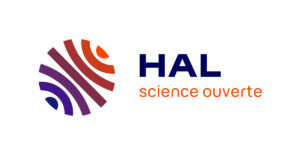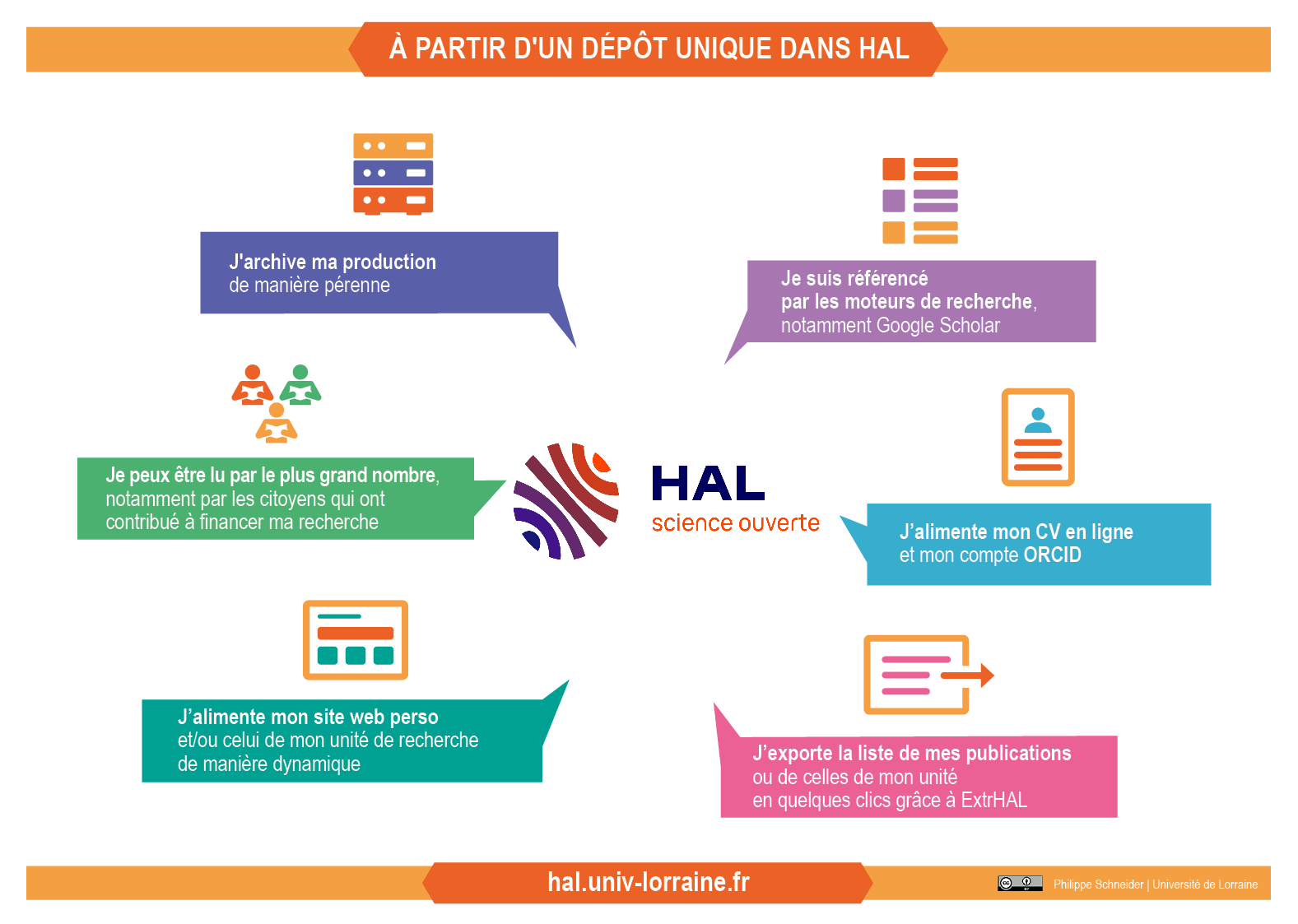
HAL est une archive ouverte, c’est-à-dire une plate-forme qui permet à la fois l’archivage pérenne et la diffusion en libre accès de la production scientifique. Elle a été créée en 2001 par le CNRS et continue à être maintenue par le Centre pour la Communication Scientifique directe (CCSD).
Plate-forme nationale et pluridisciplinaire, HAL permet également la création d’instances institutionnelles ou thématiques. HAL est au coeur de la stratégie Science ouverte à l’échelle nationale (Plan national pour la Science ouverte, CNRS, ANR, etc.) comme à l’UL.
Le portail HAL Univ. Lorraine a officiellement ouvert en mai 2016. Il est devenu la bibliographie officielle de l’Université en 2018.
 Au lancement du projet en 2014, 4 solutions ont été testées : Dspace, HAL, Islandora et Okina (basée sur Drupal). HAL, sorti vainqueur de cette phase de tests en répondant à plus de 80% des fonctionnalités attendues listées par nos laboratoires pilotes, a logiquement été choisi par le comité de pilotage. Identifiée comme archive nationale par le Ministère, HAL est utilisé par plus de 120 établissements de l’ESR et facilite ainsi la gestion des publications dans les UMR.
Au lancement du projet en 2014, 4 solutions ont été testées : Dspace, HAL, Islandora et Okina (basée sur Drupal). HAL, sorti vainqueur de cette phase de tests en répondant à plus de 80% des fonctionnalités attendues listées par nos laboratoires pilotes, a logiquement été choisi par le comité de pilotage. Identifiée comme archive nationale par le Ministère, HAL est utilisé par plus de 120 établissements de l’ESR et facilite ainsi la gestion des publications dans les UMR.
 Grâce à l’article L 533-4-1 du livre V du Code de la recherche, créé par la loi Pour une République numérique du 7 octobre 2016, lorsqu’il s’agit de recherche financée à 50% par des fonds publics, je peux déposer en accès ouvert le postprint d’un article dans un délai maximum de 6 mois pour les STM et de 12 mois pour les SHS, quel que soit le contrat signé avec l’éditeur. Voir le guide d’application de l’article 30.
Grâce à l’article L 533-4-1 du livre V du Code de la recherche, créé par la loi Pour une République numérique du 7 octobre 2016, lorsqu’il s’agit de recherche financée à 50% par des fonds publics, je peux déposer en accès ouvert le postprint d’un article dans un délai maximum de 6 mois pour les STM et de 12 mois pour les SHS, quel que soit le contrat signé avec l’éditeur. Voir le guide d’application de l’article 30.
Le postprint est la version finale de l’article, qui intègre les corrections des reviewers. Il peut également être appelé final draft post-refereeing ou accepted article ou accepted author manuscript. Son contenu est identique à la version PDF éditeur mais sans la mise en page.
Pour les autres types de publications, il convient de se référer au contrat, auquel il est possible d’ajouter un avenant (modèle en français, modèle en anglais). Notez que certains éditeurs autorisent la diffusion du texte intégral des chapitres d’ouvrages (Liste des éditeurs et conditions).
Une autre possibilité est d’appliquer la stratégie de non-cession des droits qui consiste à ne plus céder l’exclusivité de ses droits d’auteur à un éditeur pour permettre, grâce au dépôt dans HAL,le libre accès immédiat aux articles, sans frais supplémentaire, et quel que soit le modèle de diffusion de la revue dans laquelle ils sont publiés. Voir le guide.
En cas de doute, contacter : hal-contact[@]univ-lorraine.fr
En savoir plus sur les aspects juridiques liés : https://openaccess.couperin.org/ai-je-le-droit/
Le Réseau d’Appui à la Recherche est une équipe de bibliothécaires répartis sur tous les campus de l’université. Ses membres sont à votre service pour vous former, vous accompagner, effectuer le contrôle qualité des dépôts UL et répondre à toute question concernant HAL. N’hésitez pas à les contacter : hal-contact@univ-lorraine.fr
Ils peuvent intervenir dans vos équipes/unités selon les modalités qui vous semblent les plus adaptées : présentation, atelier, focus sur un point spécifique, permanence dans les unités, rendez-vous individuel, en présentiel ou à distance.
En outre, 2 ateliers en ligne sont proposés régulièrement (nombre de places limité à 5 personnes pour faciliter les échanges) :
- HAL essentiel : l’essentiel pour savoir déposer un document dans HAL (1h)
- Mon identité dans HAL : pour faire le point sur votre compte HAL, vos multiples formes auteurs et créer votre idHAL / CV HAL et lien avec ORCID (1h)

